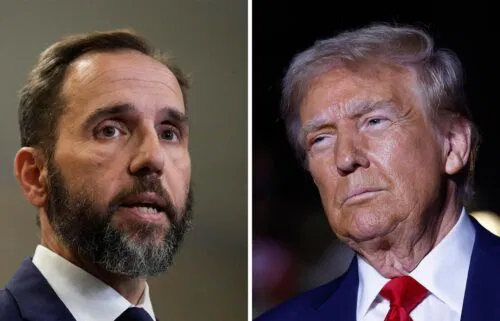Special counsel Jack Smith’s office is bracing for retribution if Trump wins
3 min read
As the legal landscape shifts, special counsel Jack Smith’s team is bracing for potential fallout should former President Donald Trump reclaim the White House. A year after launching unprecedented indictments against Trump, the special counsel’s office is strategizing on how to navigate the complex legal challenges that could arise if Trump is re-elected.
Trump has made it clear that he intends to target Smith, labeling him a “sick puppy” and vowing to dismiss him “within two seconds.” Such actions would likely halt the ongoing criminal cases related to Trump’s handling of classified documents and his attempts to overturn the 2020 election results. Notably, the Justice Department is restricted from prosecuting a sitting president, raising concerns about what might unfold should Trump return to power.
Before Inauguration Day, scheduled for January, Smith’s team is exploring legal avenues previously unconsidered by the Justice Department. A significant question looms: does the Office of Legal Counsel view a president-elect as possessing the same protections against prosecution as a sitting president? The outcome of this inquiry will shape the office’s strategy moving forward.
Sources close to the special counsel’s office indicate that Smith is determined to continue his work rather than shut down operations prematurely. “He’s not going to be the one to say, ‘I’m going to fold the tent,’” stated a former Justice Department official familiar with Smith’s perspective. This determination persists even as the prosecutors prepare for potential personal and professional repercussions, including investigations led by GOP-controlled congressional committees.
The atmosphere within the special counsel’s office has grown increasingly tense. Team members have participated in briefings on harassment, online doxing, and cybersecurity to ensure their safety amid growing political hostilities. Smith himself has a dedicated security detail, and other members of his team have taken steps to protect their personal information.
As the team becomes leaner—with some prosecutors transitioning to different roles within the Justice Department and others eyeing lucrative positions in the private sector—maintaining momentum in ongoing cases becomes paramount. If Trump wins, staff members assigned to the special counsel’s office could return to their original divisions, which would safeguard them from potential termination under a new administration.
Despite the challenges, Smith is poised to keep Trump’s cases alive in court for as long as possible. His team is currently appealing a ruling from Judge Aileen Cannon, who dismissed the classified documents case against Trump. The prosecutors are seeking to challenge this decision in a broader effort to uphold the Justice Department’s authority to oversee politically sensitive investigations, with the possibility of escalating the matter to the Supreme Court.
In Washington, the special counsel is advancing the case against Trump related to the January 6 insurrection, emphasizing the former president’s alleged conspiracy to overturn the election. Recently, the office filed a comprehensive 252-page brief intended to clarify Trump’s legal culpability, demonstrating Smith’s commitment to pushing forward, despite criticisms from Trump’s legal team regarding the unconventional nature of their approach.
With the election looming, Justice Department leaders are keenly aware of the implications should Trump secure another term. If Vice President Kamala Harris prevails, the prosecution of Trump would continue uninterrupted, albeit with individual attorneys having to decide whether to stay on long enough to bring him to trial.
Attorney General Merrick Garland has consistently maintained that the legal proceedings against Trump are now in the judiciary’s hands, reiterating the notion that the department’s role is to follow due process. However, if Trump is re-elected, the department will face unprecedented legal questions about the prosecution of a president-elect.
In the January 6 case, Smith’s team may request the federal trial judge, Tanya Chutkan, to pause proceedings during the transition period, knowing that a sitting president cannot be prosecuted. Should this transition occur, the dynamics surrounding Trump’s legal challenges could lead to further complications. Prosecutors might need to ask Chutkan to dismiss the case, a request she may not immediately fulfill, potentially extending the process and inviting further legal wrangling.
The situation is fraught with uncertainty, and as one former Justice Department official noted, the chaos Trump might instigate would be a concern for all involved. The upcoming election holds significant stakes for both the prosecution and the broader legal landscape, as the specter of retribution looms large.







